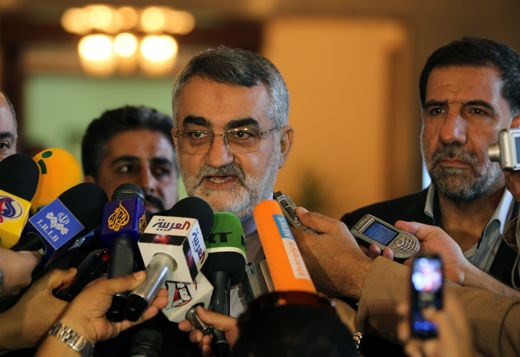The influential chairman of parliament’s Foreign Policy and National Security Committee says Iran is determined to stick to its rights in nuclear talks with P5+1. According to the Iranian Students’ News Agency the following is what Alaeddin Boroujerdi, who appeared in a talk show on Channel Two of Iran’s national TV on November 9, had to say about the country’s nuclear program and talks underway in Oman to clinch a final deal:
What we want does not run counter to the regulations of the International Atomic Energy Agency (IAEA) or to the terms of the Nuclear Non-Proliferation Treaty (NPT) and we are determined to preserve the nuclear rights and achievements of the nation.
As to why Oman has been picked as the venue of the negotiations, I must say that a nation which does not take sides with any party to the talks is usually chosen, a country which other nations do not have any problems with.
Given the special relations between Omani Officials and both sides of the negotiations, they have always tried to play a role in bringing the parties together. That’s why this country, which had already played host to similar talks in the past, was picked.
We have taken crucial steps toward training nuclear experts. We have competent human resources. […]
America and its allies have always been in quest of monopoly over nuclear science. However, in the long run, we are all heading for a decline in fossil fuels and the best alternative to fossil fuels is nuclear energy which is of great economic importance.
For instance, Tehran Research Reactor, whose output is used for medical purposes, is immensely important. When we were running out of fuel for the research facility, they played fast and loose as far as supply of fuel went, forcing us to produce 20-percent-enriched uranium on our own.
According to a bill passed by parliament, the government has to generate as much as 20,000 megawatts of nuclear electricity. Failure of the government to provide enough fuel for our nuclear power plants may prompt major powers to set conditions for us, and that is inconsistent with our principle of independence. Thus, we should have the capability of producing fuel to avoid being dependent on others.
Iran-Russia cooperation in nuclear field has driven talks for construction of more plants into high gear, and I think that is one of the reasons behind a visit by Director of the Atomic Energy Organization of Iran Ali Akbar Salehi to Russia.
The decision by Iran’s parliament about the production of 20,000 MW of nuclear electricity is final and should be implemented by the government. The West should not waste this opportunity, or it will suffer losses.
In a recent statement, the Islamic Consultative Assembly has set the red lines and we are utterly determined to preserve our rights.
At a juncture, the Americans appealed for the conversion of Arak’s heavy water reactor to light water. Neither parliament nor government approved of their demand. So the Americans accepted that we hold on to heavy water.
In terms of passive defense, Fordow nuclear plant is immune to enemy attacks. That’s why the elimination of the facility does not make sense at all, and it should carry on its activity.
The extent of enrichment is determined by our need. That means we should produce in Iran part of fuel required by our power plants.
The unfair sanctions slapped on Iran by America, Europe and the UN Security Council must be lifted. Americans want to have them lifted over time. However, if we are supposed to honor our commitments, they should lift them all at one stage.
If negotiations turn out to be inconclusive, Americans will be to blame because they demand too much. There is no reason for us not to forge ahead with 20-percent uranium enrichment for Tehran Research Reactor in case no deal is clinched.
The commitments under which we have restricted our nuclear activity will last if sanctions are lifted, otherwise there is no reason to maintain the status quo.
Iran’s nuclear program has become a source of national consensus years ago. We are asked by the public not to budge, because they have lost their loved ones for this national cause. They have gone through a lot.
The support and wisdom of the Supreme Leader are the best of backing those who are fighting [for Iran’s rights] can get.
